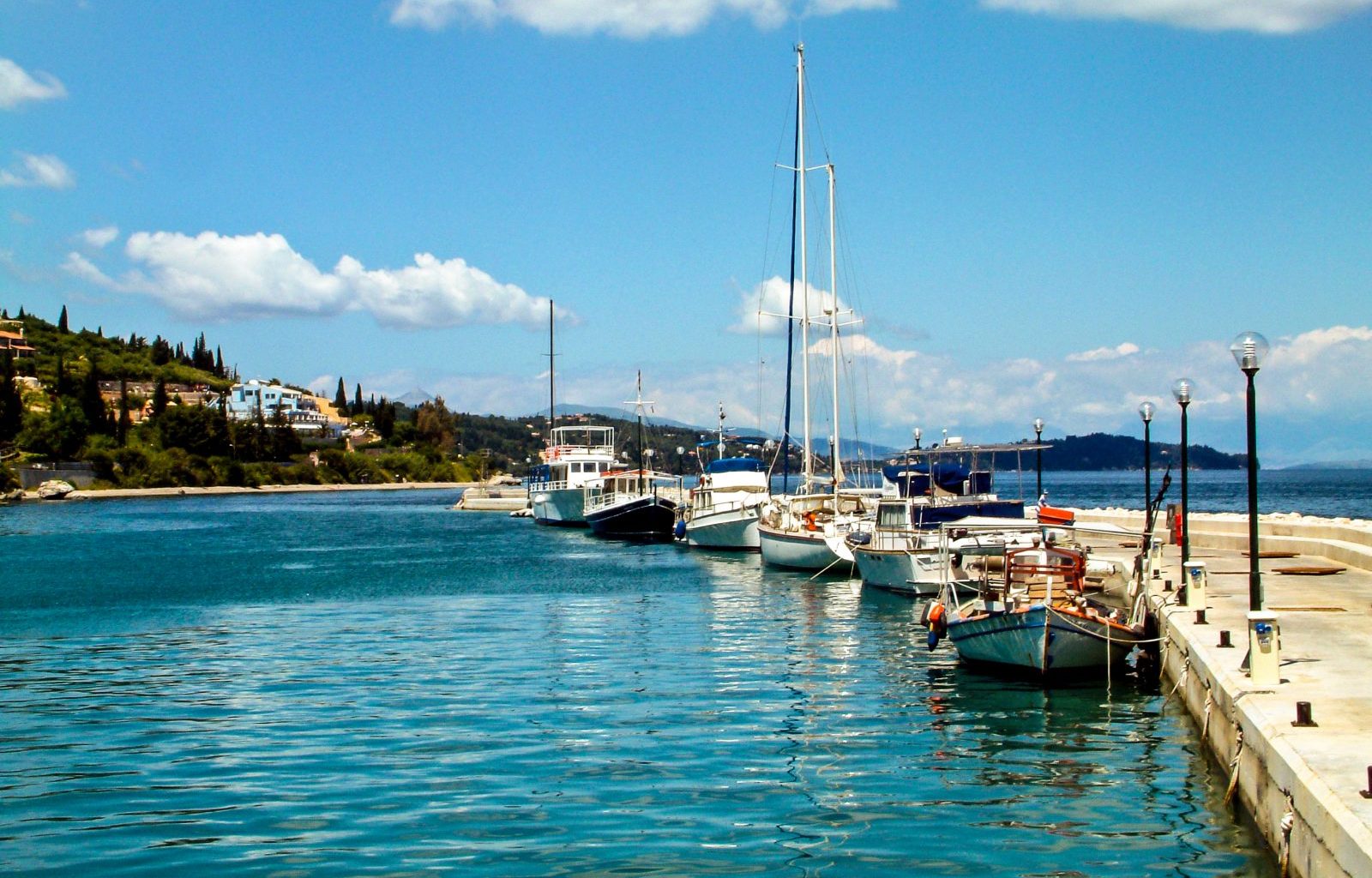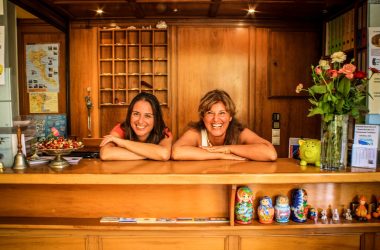The storyo of Bella Vista in three parts
Most people couldn’t understand why I left England and decided to move back to Greece, a country that was, and still is, going through many hardships. As powerful as words may be, sometimes they lack the power to convey the ocean of thoughts and feelings of a human being. I was feeling that there was something unresolved, that an unknown part of me was still in Corfu waiting for me to return, to reconnect. Whereas many at that time dreamed about leaving Greece, just the way I did many years before, I, now, needed to come back. After all, this is the place where I was born and where I grew up. There is an inexplicable bond that ties people to the soil where they moved their first steps as children. Even the freest people, the ones who dream of travelling around the whole world have a place they feel they belong to.
After many years away from my family, striving to build myself a future, I felt the need to be able to visit my family whenever I wanted to, without having to fly across a whole continent. I knew I would miss my afternoon tea at Claridge’s or my shopping sprees at Oxford Street, but I was also missing the times where I could just go over to my mother’s and have a coffee with her, with my brother and see my nieces. I was craving that sense of family. I missed walking around the village and seeing familiar faces. London is a magical city, with people from all over the world coming and going, but everything there looked so impermanent to me. By contrast, Benitses, despite being a tourist destination, is a place where everything seems to be more static and more hesitant to change. And yes, in a world where everything is fast-moving, I think that those places and communities which are still devoted to their roots and their history have a special magic in them: the magic of unchangeable and unbendable wisdom.
I had left Corfu because I felt that I couldn’t be myself there: an independent, adventurous woman following her dreams and never listening to anything but her heart. Now that I had achieved all my goals, that I knew who I was and what I wanted to do in my life, I decided to try and be myself in Corfu: a free and proud woman running her own business. Would that be possible? I was unsure. Nevertheless, I was ready to fight and to work hard in order to be happy and successful in the place where I was born: Benitses.
What follows is the story of how I made it. Have I actually?
2003-2007: Vision
Of course, I was a little afraid of what would come next, but I was young, full of energy and extremely excited about the idea of starting a new chapter. I was fully aware of the fact that I would have to face many skeletons in the closet. Actually, there happened to be many more than I expected. It was as if they had stood there for fourteen years just waiting for me to return… but, after all, that was the reason I came back: I was willing to face all the skeletons.

It was 2003 and I was determined to prove to my parents that I was strong and capable enough to run a whole hotel on my own. My parents were quite old and tired of working and I wanted to take this responsibility (which was becoming a burden for them) called Bella Vista off of my parents’ shoulders. You may think “okay, easy, she’s their daughter”. Don’t you even dare think it was easy for me to convince them that I had fully understood what this place meant to not just them, but my family as a whole.
To my parents who created it, Bella Vista was like a person, and just like a human being it was made up of a skeleton, of flesh and of a soul. And that soul contained all the dreams and hopes that connected my parents to their creature. However, that very creature’s survival was endangered when I came back in 2003. That powerful soul was waiting for someone young, inventive yet respectful of its roots and full of love to give. I think that person was me, and in a sense, I think we were both waiting for each other.
My parents had invested their whole life in this hotel, and despite being extremely simple people with little education, they managed to keep it going for a long time. It was the love for this place and for the family that gave my parents the strength to continue working relentlessly. This place proved that if you want it, you can do it. What was it that my parents wanted so fiercely? They wanted to protect us, me and my siblings, firstly from poverty and secondly from living a life in which you are stuck without opportunities. Bella Vista was a dream of freedom, and it still is.

Both my parents ran this hotel using the irrational yet powerful principle of love, and I decided to do the same. I’ve learned a lot studying and working abroad, and although many claim that it is best to keep your emotions away from the workplace, I believe that only by putting strong emotions in what you do can you have outstanding results. We are constantly influenced by our feelings, even when we think we are not. This inevitably influences our actions. Sometimes I feel that I’m excessively affected by my mood, even at work, but this is what makes this place unique to me and to the people who stay here: it is real. I cannot accept that our need for money creates businesses in which people are only seen as workers or customers, and not as whole human beings. “Encouraging people to show themselves, their feelings and share them,” this was my own vision, which I decided to combine with my parents’ dreams and hopes.
So, relying on the money I had earned in London and from selling my flat, I started to transform my parents’ creature. In the following years, I had to change its skeleton and its flesh in order to make it survive the many challenges coming from the outside, but the soul of Bella Vista always remained the same.





One very important lesson I’ve learned during my MSc at the University of Surrey was the importance of location. Businesses are never separate from the environment in which they sprout. On the contrary, there is a strong and mutual influence between business and location. Ignoring the importance of the local community had a disastrous effect in Benitses ( https://bellavistahotel.gr/benitses-a-story-of-love-and-hate/), leaving the village deserted and the hotels and restaurants on the verge of bankruptcy. It would have been impossible to make Bella Vista successful if nobody was coming to Benitses because of its reputation. Even if I turned it into a five star hotel with Jacuzzi bathtubs, it wouldn’t work.
‘Location’ was my keyword and my starting point. Before making any decision, I took my time to observe and understand what had happened to Benitses and, most importantly, why and how it went so far. I soon understood that the only way to create a harmonious relationship between the locals and the tourists was to create and promote facilities and services that respected the local culture and the environment, of course. Imposing a different way of thinking was the reason why Benitses and Bella Vista, consequently, were living this huge crisis when I came back from London. Fortunately, my education and my respect for what others had built before me taught me to do better.
Of course, I also made some changes to the building; I changed its basic structure and the colours both on the inside and on the outside. This place really needed a pinch of salt!


I soon found myself working exactly the same hours I used to do in London, but with a teeny tiny difference: there were no tourists. Yes, because I am talking about winter 2003. I spent almost six months sitting next to the hotel’s big windows and in front of my laptop. I still can see the dazed and disoriented faces of my neighbours walking past and wondering what the hell was I doing in a closed hotel, in January, all day in front of a computer.
What was I doing? I was discovering how badly the village of Benitses was portrayed on the Internet. Benitses was described as a place overcrowded with drunken British louts partying all night, as a place to avoid unless you were in need of ‘having fun’ (you know what kind of fun I mean). I knew this was true in the past, but now it was 2003, things had changed. The 3S tourism had found another home thanks to the resistance of the local people who couldn’t stand that any more. Things had changed, but that horrible image was still alive and no one wanted to come to Benitses for their holidays.
This is what I was trying to do: I was devoting a lot of time creating and sending facts sheets about Bella Vista and Benitses aimed at conveying a different image of the village. Benitses, indeed, would have been the perfect place for families who wanted to have a relaxing holiday or for bikers and hikers who appreciate the amazing natural environment we have here. Before the 80s, Benitses used to be a fishermen’s village, where local families lived in tranquillity enjoying the simple pleasures of life.

So, in the following years I had to fight a battle, a battle twice as hard as I could ever imagine: I had to fight as an outsider (I lived abroad for so long that I wasn’t even seen as a Corfiot any more) and I had to fight as a woman in an industry governed by men.
Initially, and perhaps a bit naively, I started contacting local travel agents hoping I could draw their attention to our hotel and to Benitses. Needlessly to say, it was completely useless if not even detrimental to the business. Benitses was like a banned manuscript whose copies had been destroyed by almost everyone except me, and I was like a sorceress who had to be burned at the stake because I refused to throw away the last copy of this precious piece of art called Benitses.
Not a single one of the few local travel agencies was willing to promote the village nor the hotel. Even if I had done everything right in the process of contacting the agents and promoting the hotel the way I was taught in England, they wouldn’t listen to me. All those agents did was look down on me patronisingly as if I was an alien coming from another planet with my strange and upstream ideas. I was looked at as an attractive woman with no skills (because I was too attractive to be brilliant as well), a small fish destined to be devoured by the sharks of Corfu’s macho travel industry. In Corfu there was no place for women running a business. I was not welcomed in my own home town. They thought that I would break and go back to London. They obviously had no idea who they were dealing with.
As strong as I may seem, at that time I happened to doubt my own worth, both as a woman and as an entrepreneur. But deep inside of me I could feel that it was a cause worth fighting for, not only for myself and for my own business, but for the majority of the people who live here. It was unacceptable that Benitses had to be reduced to the image of the ‘British lager louts. I knew I was right and I knew that only those who don’t surrender win. So, bravely ignoring the vast army that I was fighting against, I refused to throw in the towel and admit defeat.


As big as my enemies were, in those early years, I had a strong ally by my side, which was still unfamiliar to many in Greece: the Internet. The Internet, and the fact that I knew how to use it literally saved Bella Vista from drowning in those crucial years were Benitses was still being depicted as the abode of the devil. I made the right call, because year after year the Internet was proving to be a very successful means for tourism-related businesses. I also managed to convince one Russian travel agent to send me some limited business. It was a small step forward, but in the right direction, because in the years the Russian tourism would increase in Benitses thanks to the common religious belief and the preferred type of tourism. However, I concentrated the biggest part of my efforts on the use of the Internet: it was the only vehicle I really trusted since it was independent, free, and I was able to use it to my advantage without mediation.
I lived in Great Britain for so many years and I knew that there were many decent British tourists as well. Stereotypes and prejudices never tell the truth, and if they do, they exaggerate it to a level where it is not true any more. After all, I was a British citizen too, and as such I was hoping to attract British visitors, because it would be easier to predict their needs and to communicate with them. How on earth could I talk to a Russian? Besides, I didn’t know anything about the Russian culture, their taste in food, their habits. Much more than the local population, it was the local agents and their acquaintances who wouldn’t allow British tourists to land on the shores of Benitses, under any circumstances. On the one hand I could understand, on the other, I felt like some kind of racial discrimination was arising from this fear of chaos.
Thanks to the development of Internet bookings, in 2004 Bella Vista became the first hotel opening independently for Easter. Up to that moment the local economy was completely controlled by travel agents: nobody dared to take initiative on their own. Except me, because for me it was the only chance of survival!
Everyone in Benitses was amazed and puzzled by how quickly my business was picking up and how I actually managed to attract customers from all over the world. You cannot imagine how delighted restaurants were that they had more clients and without having to pay commissions to hotels and their travel agents. I didn’t have any agreement with a specific restaurant in Benitses and didn’t get any additional money from promoting one restaurant instead of another. I wanted to send my customers where I would like to go if I was on holiday: where I can taste the traditional cuisine without having to pay through the nose!

The war I had to fight in those early years wasn’t just a war against the monopoly of sexist travel agents but also against their corruption. Managers of well-established travel agencies were receiving more than a thousand Euros of black money per contract. Tourism businesses such as hotels, B&Bs and apartments had to pay an appalling amount of black money in order to be promoted by travel agencies and be included in their travel brochures. Apart from being illegal and unethical, it was also extremely unfair and slightly ridiculous in a place as small as Benitses where everyone knows each other. These practices were used all over Corfu, but how would I dare to raise my voice and say publicly that this was wrong and unjust? Who was I to talk to openly about an issue that everyone was clearly avoiding as if it didn’t exist? Most businesses were accepting these conditions because it was the only way to make a living in a place where tourism is the main, if not the only, source of income for the majority of the population. Nobody dared to complain.
For sure, I didn’t come back to Corfu to cause trouble. All I wanted was the opportunity to run my own business and live a decent life thanks to what I could earn by the sweat of my brow. But it was impossible for a small business to compete ethically on what appeared to be a free market but was nothing of the sort. I refused to submit to this exploitation, even if that meant becoming the black sheep and being labelled as a troublemaker by the local travel industry. I knew very well that this model wouldn’t be sustainable in the long run. Hotels were advertising themselves as four star hotels and selling themselves as two star when really they were three star hotels. I hope you understand that it was impossible for me to sell my rooms when four star hotels were giving their rooms away for the same price.
Tourist facilities were doing everything in order to sell, but at some point the small amount of money they were receiving from underselling themselves, together with the huge amount they needed to pay the agents, created the perfect recipe for disaster since they had no money to invest in improving their services. Accidents such as the carbon monoxide tragedy were just more proof that we needed to promote Corfu in an honest way instead of continuing to fool both the tourists and ourselves. It was a lose-lose situation that was detrimental to the image of Corfu and was endangering tourists.
The most powerful means for being competitive is creativity, along with quality of course. Instead of cutting prices, I decided to invest in uniqueness. I thought that If I offered a distinctly different product I would be able to first attract new customers and then to keep them thanks to the fact that I had offered them the best I could without overselling my product. What would I do differently than other hotel managers in Corfu? Oh, a lot!


First of all, I decided to focus on two main actors: the customer and, as I said before, location. I wanted to create a different travel experience: I wanted my customers to feel at home and I wanted them to feel loved in the way you are at home by your family. After all, love and family are the cornerstones that support this place. I decided to listen to each one of my customers, because everyone has a unique and inimitable story that will be part of Bella Vista forever, but only if that story is told and if somebody is ready to listen to it. As for my second focus, location, I decided to invest in the promotion of the local culture: of course, my breakfast-buffet would include traditional Greek and Corfiot dishes, but that’s not all of it. I wanted the tourists to become aware of our customs and values by informing them about festivals and every event that would bring them closer to “who we are”. Why? Not only because I think every culture is worth attention, but also because it is a way to create mutual respect between different cultures and between locals and tourists.
By the end of 2006, after completing four summer seasons since I came back from London, it became clear that my ideas of quality, attention and honesty were successful. In four summer seasons I managed to breathe new life into the hotel and to have enough visitors to keep the business going. As I hoped, our guests were delighted by the strong personality of my creature: colourful and finely decorated rooms, a delicious and rich home-made breakfast ( https://bellavistahotel.gr/breakfast-story-benitses/ ) and a warm family-like atmosphere. Surprisingly, many guests were also enthusiastic about the village, about the beautiful view of the mountains as well as the sea and, guess what, about the peace and quiet you can experience here.








However, it was impossible not to notice the closed down shops, discos and casinos along the boardwalk. Some of my guests had the courage to ask me about the buildings, others were too shy to ask. Or did they know? Did they know that the local authorities were too busy struggling for power to care about the well-being of the place and its people? Anyway, courage and persistence had proven that the way I decided to go was the right way and I was 100% sure that there was no way I was going to fail.
But let’s hold off on the professional aspects for a second and focus on myself. What was I doing for myself? What were my plans for myself? I had worked like a madman (why man? MADWOMAN) to save the hotel and put it back on its feet again, and I managed. “It’s going to be okay,” I was telling myself and actually believing. So why was I still devoting all my time to work? I was working the same hours as I used to in London, if not more. I didn’t come to Corfu for that; I came back to escape from the city-stress, but here I was even more stressed! “You’re doing it for the family,” I had been telling myself for three years, but was that still true or was that an excuse to hide the fact that my life in London had irreparably turned me into a workaholic? I couldn’t remember the last time I had some fun, except for the times I had nice conversations with my customers.
Luckily, the following winter, which was the first relaxing one after I came back, I discovered that I still knew how to have fun. I’ve always been an extremely independent person and independent people know what they need to be happy. The problem is that independence isn’t for free. In order to be independent you need a job that gives you security and such kind of a job brings about lots of responsibilities. I would call it the paradox of independence: you are free, but you cannot be free, because in order to be free you basically need to work yourself to death. So, what about me?
The first effect of this question was my choice to move out from the family house and look for a flat in Corfu Town. As much as we love Benitses, you need to admit that it’s too lonely a place, especially in the winter, for a single woman in her 40s. You already know how good a seller I am when it comes to flats, but I am also a good ‘flat-hunter’ and within three weeks from my decision, I had already found what I considered to be the coolest 1830s maisonette in the old part of Corfu Town. And I bought it, without hesitation (although it needed some refurbishments that would take years).
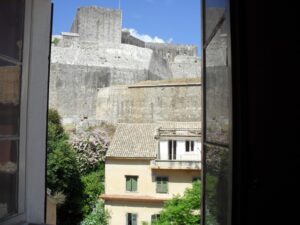

Going back to the professional aspects, something was telling me that I had to make a decision about where I would establish myself: Bella Vista was a family business. Technically, it was not MY business, and I felt I needed something I could rely on. You never know what might happen, even in your own family. I didn’t need the wealth I used to enjoy in London, but for sure I needed the certainty of a simple yet decent life. In short, I didn’t want to risk being “sacked” from the business I was running and consequently end up out of work.
Therefore, as soon as the nearby Agis Hotel (now Bella Studios) was put up for sale, I took it without thinking too much about it. In the beginning, I was tremendously scared. I was afraid I had acted too impulsively and that I had bitten off more than I could chew. I still remember moving from one appointment with accountants and bank managers to the other asking myself, what am I getting myself into? That month I wasn’t feeling very lucid, but the fact that the negotiations and the deal went quickly and smoothly planted the idea in me that it was meant to be (even if I still wasn’t sure I would manage to pay the mortgage). And today I can tell you that it was.
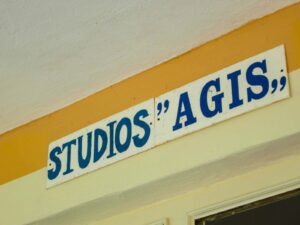
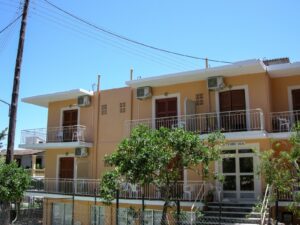
As it often happens when you’re finally doing great and everything is going as you hoped, disaster strikes and you’re whole world looks, once again, like a city after an earthquake.
At the beginning of 2007, my father fell seriously ill and was given only a few months left to live. When you face the loss of a parent, one of the first questions you end up asking yourself is, “Have I made him proud?” For me the answer was yes. I was sure he was proud that I came back to Corfu and saved the business. However, I couldn’t stand the idea that he wouldn’t be there to enjoy a little more of my success. Because no matter how much time we have had or have left, all we want is more time. Most of us only realise this when our time Is up.
On the other hand, when my father fell sick, I felt that coming back to Corfu was the best thing I could have done, for if I didn’t, I wouldn’t have been able to be by his side while he was going through his illness. As painful as it was seeing him getting weaker every single day, I was happy that I was there for him, together with my family, until the day he died. My father passed away August 15th 2007.

Professionally speaking, that summer season went very well. As for me, I was planning to move into my new maisonette within three years. When I told my mother, she made fun of me saying that it would take at least five years before I could move in. I didn’t believe her and she was actually wrong, not because I managed to move in, but because it’s been eleven years since I bought it and I’m still not in.
How is that possible? How that was possible will become clear after I tell you about the mentally, emotionally and financially stressful moments that were waiting for me which I was unable to foresee in the wake of the success I was experiencing at the time. Even though I had just purchased another business and a flat, and my father had left me, I felt strong and powerful. I had managed to survive on my own in London, to put my parents’ business back on track and even expand it. I thought I was indestructible and that I needn’t have to worry about anything. I was wrong, so wrong.











